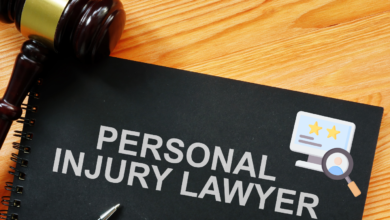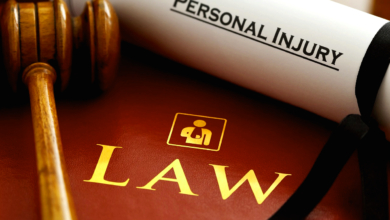Personal Injury Settlements: What to Expect in 2024
Personal injury settlements in 2024: Discover what to expect, including new laws, trends, and tips for maximizing your compensation.

Settlements for personal injuries are an essential part of the legal procedure for those who have been hurt in accidents or through negligence. It’s critical to be aware of what to anticipate in terms of settlement processes, prospective legal changes, and how they can affect your case as we approach 2024. Whether you’ve had a slip and fall, been hurt at work or been in a car accident, being up to date on the newest developments can make a big difference in how you go about getting just compensation.
Recent years have seen significant changes in the laws, the economy, and technology, all of which have an impact on personal injury settlements. It is critical for claimants and their solicitors to remain educated since the legal environment is expected to change this year due to new laws and developing court opinions. You can make sure your rights are upheld, get the most money you are due, and better prepare yourself for the process by learning what 2024 holds for personal injury settlements.
Personal Injury Settlements
Definition and Examples
A personal injury settlement is an agreement between the injured party and the responsible party’s insurance company. It compensates the victim for injuries and damages sustained in an accident. Examples include car accidents, workplace injuries, and slip-and-fall incidents.
Types of Personal Injury Cases
Personal injury cases encompass various scenarios, including medical malpractice, product liability, and wrongful death. Each type requires a unique approach and understanding of specific laws.
The Settlement Process
Initial Consultation with an Attorney
The first step in pursuing a personal injury settlement is consulting with an attorney. This meeting allows you to discuss the details of your case and determine the best course of action.
Investigation and Evidence Gathering
Your attorney will gather evidence, including medical records, witness statements, and accident reports. This investigation is crucial for building a strong case.
Demand Letter to the Insurance Company
After collecting evidence, your attorney will draft a demand letter outlining your injuries, damages, and the compensation sought. This letter is sent to the insurance company to initiate negotiations.
Negotiation Phase
Negotiations between your attorney and the insurance company can take time. Both parties will discuss settlement offers and counteroffers until an agreement is reached.
Reaching a Settlement Agreement
Once both sides agree on a settlement amount, the agreement is formalized. You will receive compensation for your injuries and damages.
Potential for Going to Trial
If negotiations fail, your case may go to trial. This step is less common but sometimes necessary to achieve fair compensation.
Factors Affecting Settlement Amounts
Severity of Injuries
The extent of your injuries significantly impacts the settlement amount. More severe injuries typically result in higher compensation.
Medical Expenses
Medical bills, including future treatment costs, play a crucial role in determining your settlement. Keeping detailed records of all medical expenses is essential.
Lost Wages and Future Earnings
If your injury prevents you from working, you may be entitled to compensation for lost wages and potential future earnings.
Pain and Suffering
Pain and suffering are non-economic damages that account for the physical and emotional distress caused by your injury. These damages can be substantial.
Comparative Negligence
If you share some fault for the accident, your settlement may be reduced based on your percentage of responsibility. This concept is known as comparative negligence.
Changes in 2024
New Laws and Regulations
Stay informed about any new laws affecting personal injury settlements in 2024. Legislative changes can impact the process and compensation amounts.
Impact of Recent Court Rulings
Recent court decisions may set precedents that influence your case. Understanding these rulings can help you anticipate potential outcomes.
Economic Factors
Economic conditions, such as inflation and healthcare costs, can affect settlement amounts. These factors may influence the compensation you receive.
Technological Advances in Legal Processes
Advancements in technology, such as virtual courtrooms and electronic filing, streamline the legal process. Staying updated on these changes can benefit your case.
How to Maximize Your Settlement
Hiring an Experienced Attorney
An experienced attorney can navigate the complexities of personal injury law, negotiate effectively, and ensure you receive fair compensation.
Documenting Everything
Keep detailed records of your injuries, medical treatments, and expenses. Thorough documentation supports your claim and maximizes your settlement.
Avoiding Common Pitfalls
Avoid common mistakes, such as speaking with insurance adjusters without legal representation or accepting the first settlement offer. These errors can reduce your compensation.
Common Myths about Personal Injury Settlements
All Cases Go to Trial
Most personal injury cases are settled out of court. Trials are time-consuming and costly, so parties often prefer to settle.
Settlements Happen Quickly
The settlement process can take time, especially if the case is complex. Patience and persistence are key.
You Can’t Afford a Lawyer
Many personal injury attorneys work on a contingency fee basis, meaning they only get paid if you win your case. This arrangement makes legal representation accessible.
Real-Life Case Studies
Car Accident
In this case, a driver received compensation for injuries sustained in a rear-end collision. The settlement covered medical expenses, lost wages, and pain and suffering.
Workplace Injury
Workplace injuries can significantly impact an individual’s life, leading to physical pain, emotional stress, and financial strain. These injuries occur due to accidents or unsafe conditions at the job site, ranging from minor slips and falls to severe incidents like machinery malfunctions or exposure to harmful substances. The consequences often include medical expenses, lost wages, and, in some cases, long-term disability.Employers are generally required to provide a safe working environment and, in the event of an injury, to offer support through workers’ compensation benefits.
Slip and Fall
A slip-and-fall victim received a settlement for injuries sustained in a grocery store. The compensation addressed medical costs and pain and suffering.
Read More: How to Improve Patient Care: Best Practices for Healthcare Professionals
Conclusion
It is imperative that we be up to date on current law developments and market trends as we negotiate the difficulties of personal injury settlements in 2024. The amount of compensation you may receive and the settlement procedure may be affected by new rules and technology developments that come this year. Gaining an understanding of these elements can help you manage your claim more skillfully and collaborate with your attorney, from changing legislation to the impact of the economy.
In the end, obtaining a just settlement requires a blend of expertise, meticulous record-keeping, and capable legal counsel. You can increase your chances of getting a good result by keeping up with 2024’s advancements and avoiding typical errors. Recall that being organised and getting expert counsel can make all the difference in effectively navigating the personal injury settlement procedure.
FAQs
What should I do immediately after an injury?
Seek medical attention, document the incident, and consult with an attorney.
How long does the settlement process take?
The duration varies but can take several months to a few years, depending on the case complexity.
Can I settle without a lawyer?
While possible, having an attorney significantly increases your chances of receiving fair compensation.
What if I’m partially at fault for my injury?
You may still receive compensation, but it may be reduced based on your percentage of fault.
How are pain and suffering calculated in a settlement?
Pain and suffering are typically calculated using a multiplier of your economic damages or through a per diem method.











